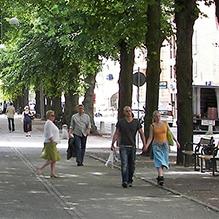I, like most other researchers, am passionate about the topics I investigate. So when I was recently presented with an opportunity to participate in a TV programme, I was quite excited to share my work with a new audience.
The Turkish Television programme ‘Roundtable’ consisted of a 30-minute discussion between four panelists focusing on climate change and the role of cities. I was told by one of the show’s producers a day before filming the programme that the host would ask questions about why cities are meaningful when discussing climate change, explore how cities can contribute toward combating climate change and what the recent climate emergency declarations by a growing number of local governments mean.
With the discussion parameters in mind, I knew there were two key lessons from my research I wanted to share. First, I raised the idea that the public — average citizens and individuals — have a central, critical role in facilitating urban climate action. We know there are lots of ways to meaningfully mitigation carbon emissions at the urban level that could be implemented today that does not require any technological interventions or large-scale infrastructure changes. For example in Greater Manchester, we know that about 20% of all journeys made are short car trips of 2km or less (pdf). If the majority of these short car journeys were instead made by cycling, walking or on public transit, that shift would cause an appreciable reduction in the city-region's carbon footprint (pdf).
Cycling, walking and public transportation are all relatively low-tech transportation modes that can currently be implemented more widely to make a difference today in reducing urban carbon emissions. The catch? Making these modal shifts at a meaningful scale will require the public to change their behaviour. Public behaviour change is key to slashing urban carbon emissions by using technologies and solutions that currently exist and have been proven to be effective. The only way cities will be able to realise this potential, is by doing a far better job engaging with the public and formally recognising that we all are part of the solution.
The second point I added to the discussion is the need for so-called experts and policymakers to work jointly with the public in developing climate change solutions rather than mandating solutions to the public. Citizens possess experiential knowledge that is gained implicitly through repeated daily activities. This knowledge is valuable to the policy development process and can help navigate barriers to implementing policy. Furthermore, the unique perspective of citizens as ‘non-technical’ experts gives them the ability to approach a problem with fresh eyes that practitioners may have been acutely focused on for years. This enables citizens to be creative and consider imaginative solutions that can be more difficult for tenured policy professionals to generate.
Policymakers can inadvertently harm the public or mistakenly intensify the pain of already stressed citizens when citizens are not involved in developing policies that will affect their lives. For example, the Yellow Vest protests across France and the US state of Oregon’s legislature crisis are both instances where sections of the public become alienated and antagonistic through proposed climate policies. To be clear, I believe that in both of these cases the public uproar was rooted in a deeper, legitimate pain that the proposed climate policies unintentionally exposed. Years of massive funding cuts to social services and an ever widening incoming gap put the largely working-class Yellow Vest protesters in an economically vulnerable position. An environmentally-motivated tax hike on petrol was just the final straw that enflamed this long seeded anguish. Meanwhile in Oregon, logging was once one of the state’s largest economic sectors that employed a huge percentage of the workforce. However, over the last several decades the industry has severely atrophied so when a proposed carbon cap and trade bill was moving through the legislature, it was seen by the state’s dwindling remaining loggers as a threat to their livelihood and a final death knell to their industry. Had citizens been involved in developing these policies, both crises could have potentially be avoided while also alleviating entrenched grievances.
After I discussed the need to work with citizens as co-producers in developing solutions to climate change, David Simon, the director of Mistra Urban Futures, agreed and added, “we need to co-produce solutions to climate change, especially with low income and marginalised communities. These are the people who experience and understand what the challenges of climate change truly mean… These are the voices that need to be at the table as much as the mayor, the engineer, the town planner, and the other so-called experts.”
I was pleased to help steer the conversation towards unpacking the role of the public and why citizens need to be an integral component to urban climate action. With the knowledge I’ve gained through my research, I believe people and citizens will ultimately be the key to realising urban climate action.
Ryan Bellinson, Urban Institute, University of Sheffield and Mistra Urban Futures








